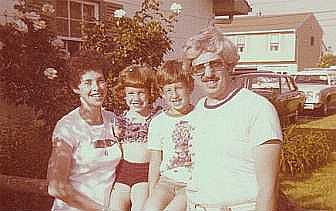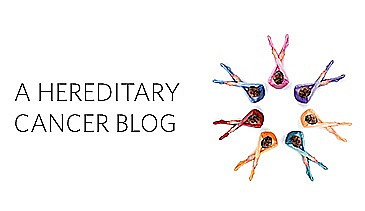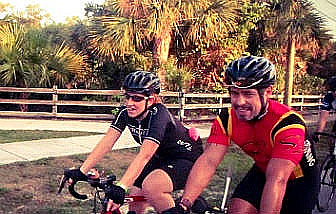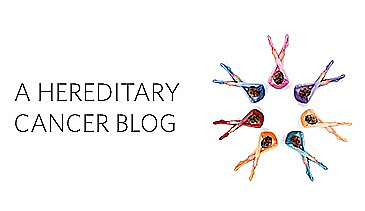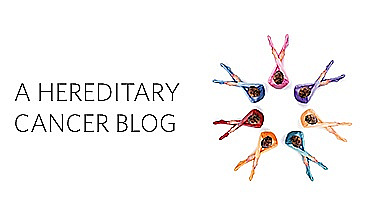- By Theresa Smith
- Posted March 8, 2016
These are my genetic test results... please don't shoot the messenger.
The initial shock from receiving my positive results for the BRCA2 gene mutation was now turning into "a low grade fever" of concern, which was my new reality. I already explained the news to my immediate family, but I started thinking about all the extended family members my result could affect, too. My extended family is large - over…
- By Eve Mart
- Posted March 1, 2016
Being a Survivor Doesn’t Mean You Can Ignore Me
My mom was first diagnosed with breast cancer in 1989, when breast cancer was still whispered about and long before Angelina Jolie put genetic testing on the Hollywood map. My mom complied with the treatment recommended for her at the time, which included a lumpectomy, chemotherapy and radiation. Eighteen years later, in 2007, I was 34 years old…
- By Theresa Smith
- Posted February 23, 2016
What about my “foobies” surgery?
I did finally come to terms with my decision to have a preventive bilateral mastectomy to lower my risk of breast cancer from my BRCA2 gene mutation. I was scheduled with my surgeon, but I was put on a rolling schedule, which meant my date was not set in stone. I asked at what point I got to keep my surgery date, instead of my date being…
- By Dr. Robina Smith
- Posted February 18, 2016
Following Positive/High Risk Patients and Survivors
According to the National Cancer Institute SEER (Surveillance, Epidemiology, and End Results) stat fact sheet on female breast cancer there were an estimated 12.3% of women living with breast cancer in the United States in 2012. 98.6% of breast cancer survivors diagnosed with early stage breast cancer are alive after 5 years or more. As early detection,…
- By Eve Mart
- Posted February 16, 2016
Treatment to Survivor
Being a breast cancer survivor isn’t a static label. For me, being a breast cancer survivor has added another layer to the person I am and have become, and that has been an evolutionary process. It took time to get my energy back, but I now happily maintain a very active lifestyle. Again, it took time, and patience was not my strong suit.…
- By Dr. Robina Smith
- Posted February 11, 2016
What to Expect from Surgery and Recovery
Whether a woman is facing the decision to have breast surgery as a treatment option for cancer or she is being proactive and having a preventive procedure done to reduce the risk of ever having cancer, the decision is not an easy one. Surgery can be a frightening experience for some people, and rightfully so. Although surgery is designed to physically…
- By Theresa Smith
- Posted February 9, 2016
So I am supposed to chop off my breasts?
When I was offered the option of having a preventive bilateral mastectomy, it was so overwhelming. I couldn’t think about. I couldn’t talk about it with anyone. I didn’t research the procedure. I just put off thinking about it entirely. I couldn’t handle it emotionally, and the thought of what it would do to me physically was very scary…
- By Jessica Profato, MS, CGC
- Posted February 4, 2016
Coping with Cancer: 5 Lessons from my Patients
As a clinical genetic counselor, a big part of my job was educating my patients about the basics of genetics and hereditarycancer. Another equally, if not more, important part of my job was to talk to them about how a diagnosis of cancer, a positive genetic test result, or a combination of the two was impacting their life and those of their family…
- By Eve Mart
- Posted February 2, 2016
Healthy Habits, Healthy Mind
The funny thing about ‘healthy habits’ is that you can do everything ‘right’, but there are no guarantees in life. For me, breast cancer is hereditary. he·red·i·tar·y Something (like a health problem, like cancer) that is due to inherited genetic changes (mutations), which can be passed from parent to child. I have a BRCA1…
- By Dr. Robina Smith
- Posted January 28, 2016
Preventive Oncology
To this date, we cannot totally prevent cancer from forming; however, for certain cancers we can reduce the risk of it developing. Approximately one half of cancer cases can be prevented by modifying risk factors or by early detection of precancerous lesions. For breast and ovarian cancers, approximately 10% will develop due to hereditary predisposition.…

